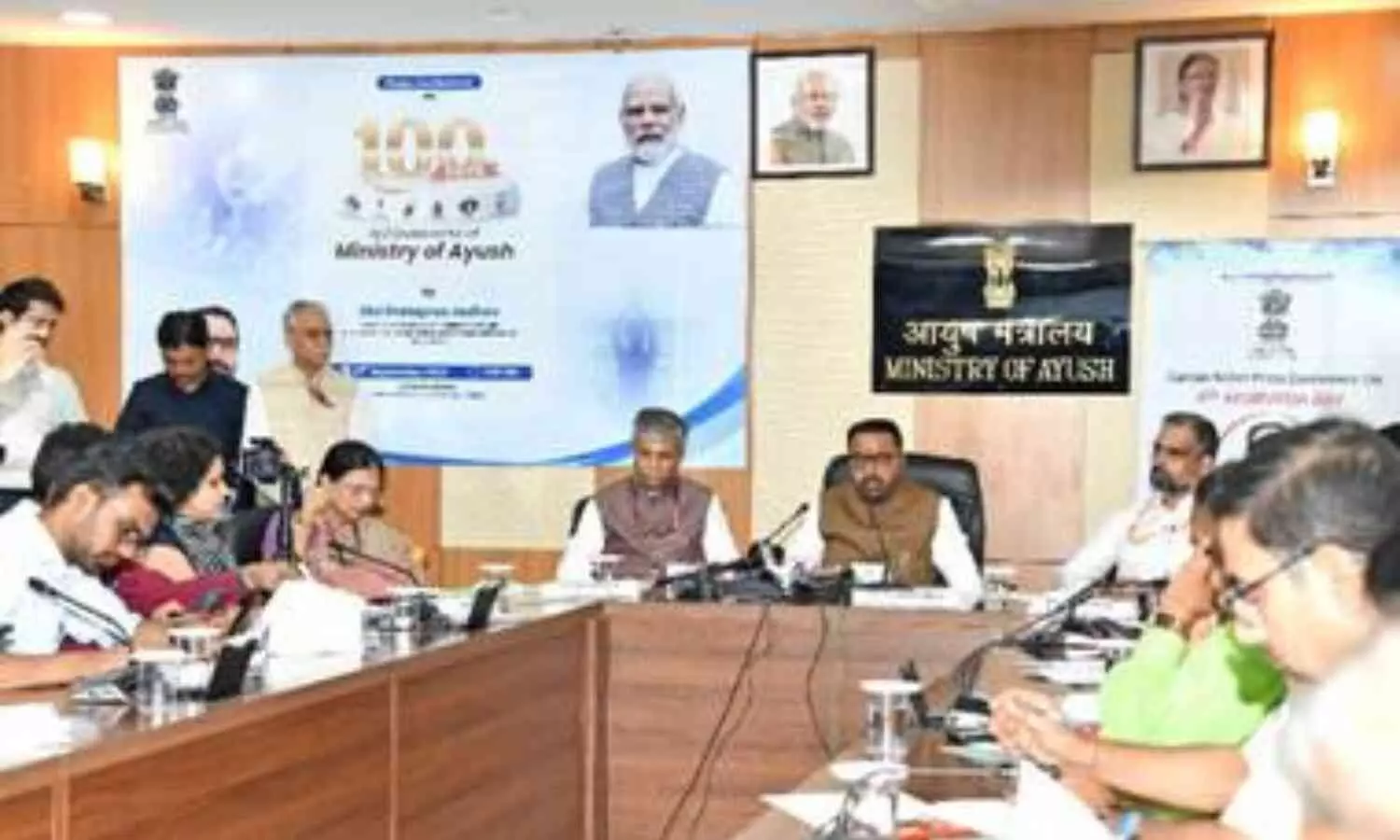Ministry of Ayush Organizes Over 14,000 Geriatric Health Camps, Surpassing 100-Day Target

New Delhi: In a media briefing, Union Minister of State for Ayush (Independent Charge), Shri Prataprao Jadhav, outlined the key accomplishments of the Ministry of Ayush during its first 100 days. Jadhav stated, “Under the leadership of Prime Minister Shri Narendra Modi, the Ministry has made progress in promoting traditional Indian systems of medicine and strengthening Ayush in the field of international cooperation.”
One of the significant advancements mentioned by the Minister was the inclusion of Ayurvedic treatment under the Ayushman Bharat - Pradhan Mantri Jan Arogya Yojana (AB-PMJAY). “The Ministry convened a review meeting to incorporate Ayurvedic packages under the Ayushman Bharat scheme. As of now, 170 packages have been finalized, with the potential to increase this number based on requirements. A Strategic Purchasing Committee has been established to finalize cost structures and ensure the affordability of Ayush treatments,” Jadhav explained.
The Minister also underscored the health of every citizen as paramount and initiated a special drive to conduct "Prakriti Parikshan" across India.
Key Achievements of Ayush in 100 Days
1. Donor Agreement with WHO: A donor agreement between the Ministry of Ayush and the World Health Organization (WHO) was signed on July 31, 2024, in Geneva. This agreement aims to enhance global cooperation in integrating Ayush systems into healthcare and emphasizes evidence-based traditional medicine.
2. MoUs with Vietnam and Malaysia: India signed key Memorandums of Understanding (MoUs) with Vietnam and Malaysia in the field of traditional medicine. The MoU with Vietnam focuses on collaboration in medicinal plants, while the agreement with Malaysia advances research and knowledge exchange in Ayurveda. An Ayurveda Chair has also been established at the Universiti Tunku Abdul Rahman (UTAR) as part of this collaboration.
3. "One Herb, One Standard" Initiative: To strengthen traditional medicine, the Ministry signed an MoU between the Pharmacopoeia Commission for Indian Medicine & Homoeopathy (PCIM&H) and the Indian Pharmacopoeia Commission (IPC) to implement the "One Herb, One Standard" initiative. This aims to improve the quality and safety of herbal medicines, aligning them with global health standards.
4. Special Medical Stores for Ayush Medicines: To ensure the accessibility of Ayush medicines, the government plans to open special medical stores at the tehsil level. These stores will make herbal and traditional medicines more readily available, particularly benefiting public healthcare in rural and urban areas.
5. Certification of Ayushman Arogya Mandir (Ayush): Shri Prataprao Jadhav announced that the evaluation of 1,489 Ayushman Arogya Mandirs (Ayush) has been completed by the National Accreditation Board for Hospitals and Healthcare Providers (NABH), with 1,005 centers certified for Ayush Entry Level Certification (AELC). This initiative aims to strengthen the quality of healthcare services under the National Ayush Mission.
Major Campaigns and Initiatives
1. "Har Ghar AyurYog" Campaign: The Ministry launched the "Har Ghar AyurYog" initiative to promote the adoption of Ayurveda and Yoga across communities. The campaign includes the integration of Yoga in the Fit India School certification program and a national initiative called "Bharat Ka Prakriti Parikshan."
2. Geriatric Health Camps: Exceeding its 100-day target of organizing 10,000 geriatric health camps, the Ministry of Ayush held over 14,692 camps nationwide. These camps provided free consultations and therapies using Ayurveda, Yoga, Unani, Siddha, and Homoeopathy to elderly citizens.
3. Centers of Excellence in Ayush: Six Centers of Excellence have been established in collaboration with top institutions like IISc Bangalore, IIT Delhi, and JNU New Delhi. These centers, funded with ₹52.47 crore, will focus on research and healthcare innovations in traditional medicine.
4. Inclusion of Ayush Packages in AB-PMJAY: Ayurvedic treatment packages have been incorporated into the Ayushman Bharat scheme. This integration aims to offer affordable Ayush treatment options under India’s largest health insurance scheme.
5. Swachhata Campaign: The Ministry participated in the Swachhata Hi Sewa (SHS) 2024 campaign, focusing on cleanliness drives and community participation. The initiative emphasized public cleanliness through pledges, contests, and large-scale cleaning campaigns in public spaces.
In conclusion, the Ministry of Ayush's first 100 days focused on advancing traditional medicine, improving access to healthcare, and integrating Ayush treatments into mainstream healthcare systems.


